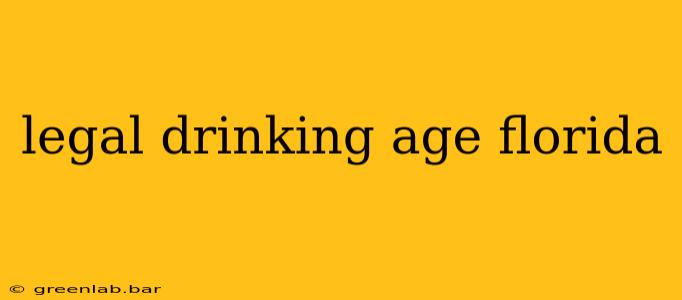Florida, like most U.S. states, adheres to a minimum legal drinking age (MLDA) of 21. This means that it is illegal for anyone under the age of 21 to purchase, possess, or consume alcoholic beverages. This law is strictly enforced, and violations can result in significant consequences. This guide delves deeper into the specifics of Florida's legal drinking age laws, addressing common questions and clarifying potential gray areas.
Understanding Florida's Minimum Legal Drinking Age
The 21-year-old MLDA in Florida is enshrined in state statute and is consistent with the federal law established by the National Minimum Drinking Age Act of 1984. This federal law incentivizes states to maintain a 21-year-old MLDA by threatening to withhold a portion of federal highway funds if they don't comply. The result is a nationwide standard, ensuring consistency across state lines.
Exceptions to the Rule:
While the general rule is clear, there are a few limited exceptions to Florida's legal drinking age:
- Religious Observances: The consumption of wine during religious ceremonies is generally permitted, regardless of age. However, this exemption is very narrowly defined and must be strictly within the context of a recognized religious practice.
- Private Property with Parental Consent: While the purchase and possession of alcohol remains illegal for minors, consumption on private property with explicit parental consent might be permitted in some very specific situations. This is a complex area, and parental consent does not shield minors from potential legal repercussions if other laws are broken, such as public intoxication or driving under the influence.
It's crucial to understand that these exceptions are extremely limited and don't offer broad exemptions from the law. The safest course of action is to always comply with the 21-year-old MLDA.
Penalties for Underage Drinking in Florida
The consequences of violating Florida's MLDA can be severe, ranging from fines and community service to jail time, depending on the nature of the offense and the individual's prior record. These penalties can significantly impact a person's future opportunities, particularly in areas like employment and education. Potential penalties include:
- Fines: Significant monetary fines can be levied for underage possession, consumption, or purchase of alcohol.
- Community Service: Court-mandated community service is a common punishment for underage drinking offenses.
- Jail Time: In more serious cases, such as driving under the influence (DUI) while underage, jail time can be a possibility.
- License Suspension: Driving privileges can be suspended or revoked for underage drinking-related offenses, particularly if they involve a DUI.
- Criminal Record: A conviction for underage drinking can result in a criminal record, which can have long-term consequences.
Resources for Help and Further Information
If you or someone you know is struggling with alcohol abuse, several resources are available to provide support and guidance. These resources offer confidential assistance and can help individuals navigate the challenges associated with alcohol dependence. Contacting local health departments or searching online for alcohol abuse resources in Florida can provide access to relevant services.
Conclusion
Florida's minimum legal drinking age of 21 is a law designed to protect public health and safety. Understanding the implications of violating this law is crucial for all residents and visitors to the state. Adherence to the MLDA is not only the responsible course of action but also essential to avoiding significant legal and personal consequences. Remember that the exceptions are extremely limited, and compliance is the best approach.

